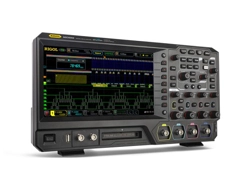Loading ...
Loading ...
Loading ...

RIGOL Chapter 5 To Trigger the Oscilloscope
5-46 MSO5000 User Guide
⚫ Sync: triggers on the last bit of the sync field.
⚫ ID: triggers when the frame with an ID equal to the selected value is detected.
Press ID, then rotate the multifunction knob or use the pop-up numeric
keypad to set ID.
⚫ Data: triggers when the data that meet the preset conditions are found.
➢ Press Bit X to set the data bit that needs to be operated on. For setting
methods, refer to descriptions in "I2C Trigger (Option)".
➢ Press Bytes, then rotate the multifunction knob or use the pop-up
numeric keypad to set the length of the data. Its range is from 1 to 8.
⚫ Data&ID: triggers when a frame with a specified ID and data that meet the
preset conditions are both found.
➢ Press Bit X to set the data bit that needs to be operated on. For setting
methods, refer to descriptions in "I2C Trigger (Option)".
➢ Press Bytes, then rotate the multifunction knob or use the pop-up
numeric keypad to set the length of the data. Its range is from 1 to 8.
➢ Press ID, then rotate the multifunction knob or use the pop-up
numeric keypad to set ID.
⚫ Sleep: triggers when the sleep frame is found.
⚫ Wakeup: triggers when the wakeup frame is found.
⚫ Error: triggers on the specified type of error frame. Press Error Type and select
the desired error type: Sync, Even Odd, or Check Sum.
Protocol Version:
Press More → Version to select the protocol version that matches the signal under
test. The available versions include 1.X, 2.X, and Both.
Baud Rate:
Press More → Baud to set the baud rate. Three setting methods are available for
baud rate:
⚫ Press Baud, then set the user-defined baud rate with the displayed numeric
keypad.
⚫ Press Baud, then rotate the multifunction knob to select the preset baud
rate from the available options. The available baud rates include 1.2 kbps, 2.4
kbps, 4.8 kbps, 9.6 kbps, 19.2 kbps, and etc.
⚫ Press Baud, then rotate the multifunction knob to adjust the baud rate at a
small step.
Sample Position:
Sample position is a point within a bit’s time. The oscilloscope samples the bit level at
this point. The sample position is represented by the proportion of "the time from the
start of the bit to the sample position" to the "bit time", as shown in the figure below.
Loading ...
Loading ...
Loading ...
